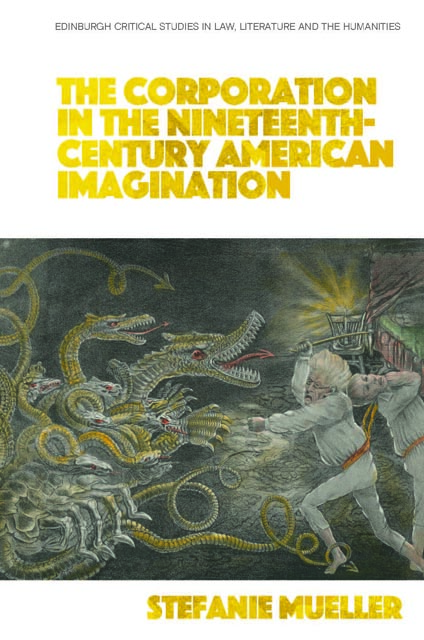Book contents
- Frontmatter
- Contents
- List of Figures
- Acknowledgments
- Introduction: The Many and the One: Corporate Bodies and the Body Politic in US Law and Culture
- 1 Narrating Monopoly and Empire: Austin, Irving, and the Charles River Bridge Case
- 2 The Soulless Corporation: Cooper and the Decline of the Republic
- 3 Satanic Corporate Agents in the Marketplace: Hawthorne, Melville, De Forest, and the Uses of Allegory
- 4 Incorporating the Nation: Ruiz de Burton and “Quasi Public” Corporations
- 5 The End of Individualism: Tarbell, Norris, and the Power of Combinations
- Conclusion: Frankenstein in a Gray Flannel Suit
- Bibliography
- Index
1 - Narrating Monopoly and Empire: Austin, Irving, and the Charles River Bridge Case
Published online by Cambridge University Press: 25 April 2023
- Frontmatter
- Contents
- List of Figures
- Acknowledgments
- Introduction: The Many and the One: Corporate Bodies and the Body Politic in US Law and Culture
- 1 Narrating Monopoly and Empire: Austin, Irving, and the Charles River Bridge Case
- 2 The Soulless Corporation: Cooper and the Decline of the Republic
- 3 Satanic Corporate Agents in the Marketplace: Hawthorne, Melville, De Forest, and the Uses of Allegory
- 4 Incorporating the Nation: Ruiz de Burton and “Quasi Public” Corporations
- 5 The End of Individualism: Tarbell, Norris, and the Power of Combinations
- Conclusion: Frankenstein in a Gray Flannel Suit
- Bibliography
- Index
Summary
In the popular imaginary of the late eighteenth and early nineteenth centuries, corporations were commonly associated with monopoly. There were at least two reasons for this: for one thing, some charters did indeed include “monopoly franchises, such as the right to build and operate a bridge over a particular body of water, or the right to enter an industry in which only chartered firms were legally authorized to operate, as was often the case in banking” (Hilt 41). But it was also the special charter that was necessary to incorporate such projects that encouraged this association. Even though, after US independence, the power to grant charters of incorporation rested with state legislatures rather than the English Crown, such charters were still a special legal privilege for those to whom they were granted, whether they included monopoly franchises or not; not every citizen was equally in a position to obtain such a charter. In addition, corporate and monopoly jurisprudence still relied heavily on the English common-law tradition, which was increasingly seen as an outdated and foreign body of law. During the Jacksonian era’s push for equality in the political as well as the economic sphere, such special privileges and English traditions became the target of criticism.
Yet the young nation also needed capital and enterprise to grow its economy, and incorporation offered a powerful instrument for both. As Kent Newmyer notes, “By facilitating the accumulation of capital from a broad base without sacrificing centralized management, the corporation especially suited a country lacking consolidated wealth” (824). Hence, US law and economic policy regarded private investments largely “as an extension of state efforts to further economic growth,” and there was no standing legal distinction “between private and public forms of investment” until the late eighteenth century (Horwitz, 1780–1860 111). But by the beginning of the nineteenth century (and even more so during the Jacksonian era), such earlier “monopolistic strateg[ies]” were increasingly understood as an obstacle to economic growth (Horwitz, 1780–1860 111). Moreover, English common law was largely “anti-competitive,” which was partly an effect of “earlier feudal or mercantilist influences” (Horwitz, 1780–1860 114) and partly due to the broad understanding of businesses such as mills, bakehouses, or malthouses as “public enterprises” (Horwitz, 1780–1860 115).
- Type
- Chapter
- Information
- Publisher: Edinburgh University PressPrint publication year: 2022



